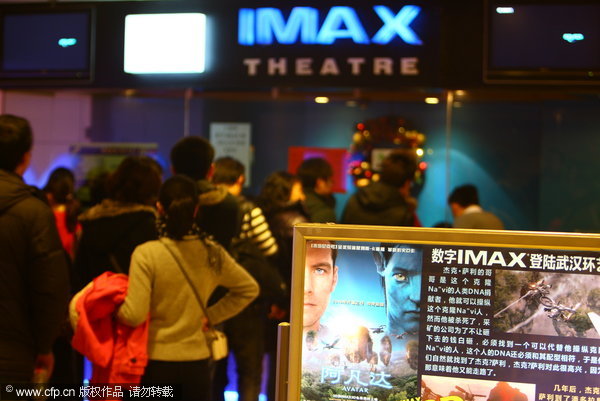Avatar: A path to Pandora's Box?
|
|
|
People waited to get a 3D-IMAX ticket of Avatar?in a cinema in Wuhan. [CFP] |
As moviegoers hustle to get "precious" tickets to Avatar, the scalping business is booming. A search on Taobao, China's largest Internet retail platform often referred to as "China's e-Bay," showed tickets selling for 200 yuan to 300 yuan in Beijing. In Shanghai, prices went into the thousands. The most expensive ticket had an asking price of 5,000 yuan.
Meanwhile, cinemas hoping to move some of that money into their own pockets are raising ticket prices, taking moviegoers for a roller coaster ride last weekend. After prices for Avatar in 3-D IMAX rose 20 yuan to 150 yuan (US$22) in Beijing, Peace Cinema in Shanghai announced it was increasing its tickets to 180 yuan (US$26). Widespread criticism on the Internet and in the media forced the cinema to abandon the idea.
Avatar has opened a Pandora's box of high prices.
China hasn't seen such fever for a film in more than 20 years. But the high ticket prices for Avatar may reflect more problems than it being a popular movie.
First, the lack of IMAX and 3-D screens is one of the main reasons for the sky-high prices in China. There are about 4,700 screens, 11 IMAX screens and some 800 screens capable of showing 3-D films across China. The United States, in contrast, has about 40,000 screens, among which 179 are IMAX screens and 3,500 can show 3-D films.
That is more than 16 times and 4 times, respectively, the number of IMAX and 3-D-capable screens than China, for a population that is one-third the size.
"The ideal number of screens in China is between 10,000 and 20,000," said Gao Jun, vice president of the New Film Association. "Then it will be easy to produce a Chinese blockbuster that can earn 1 billion yuan at the box office."
Second, there are no laws in the Chinese mainland that regulate movie ticket prices. In Hong Kong, scalpers are scarce, in part because of public entertainment regulations that make it a crime to sell tickets at a higher price than the official price. Anyone caught doing so will be fined a maximum of HK$2,000 (1,760 yuan or US$258). Taiwan has a similar law. The mainland punishes scalpers selling transportation tickets by punching them; a lawyer friend said lawmakers have refrained from regulating movie ticket prices because scalping them does not harm public security. But audiences are not obligated to pay for the lack of laws. People's right to watch a movie should not be harmed by speculators, either.
Lastly, Chinese people seem to have a habit of impatience. Unlike sports games or movie concerts, movies are shown for weeks. People don't need to see them right after the premiere, especially if tickets are so hard to get. "Chinese audiences always love to watch what others watch," said Yin Hong, professor of film and television communication at Tsinghua University. There are a lot of followers among real Avatar fans who are rushing to see the movie because other people are. The scarcity of tickets has made them even more desirable – the 5,000-yuan ticket advertised as "an ideal present for your boss." Instead of going to real fans, tickets have become special presents.
The good news is that the State Administration of Radio, Film and Television and the Ministry of Public Security are working on regulating ticket scalpers, said Yin. Shanghai's Peace Cinema also announced Wednesday that it will continue showing Avatar in IMAX 3-D next month. We can expect the movie to lead us to a new territory of a more regulated film market, and perhaps the Pandora's Box will be shut someday.
 0
0 







